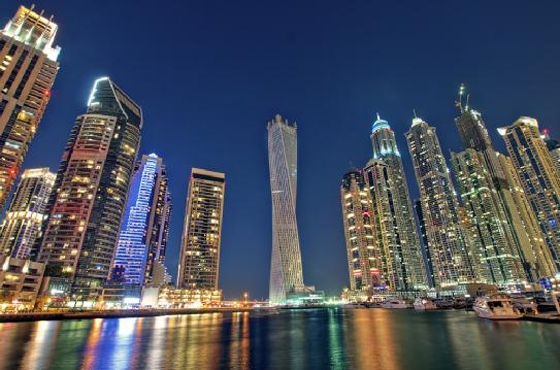Strong fundamentals and a diversified economy are keeping concerns at bay in Dubai, despite a potential cooling of investor sentiment across the region and weakening global conditions.
Dubai announced a balanced budget for 2015 at the start of January, as it plans to increase spending by 9% year-on-year, with spending and revenues both projected at Dh41bn ($11.2bn), according to an official statement. The absence of a budget deficit – the first time since the global financial crisis – is expected to boost business activity and further stimulate the economy.
Growth is expected to accelerate in 2015 to reach 4.5%, according to Mohammed Lahouel, chief economist at Dubai’s Department of Economic Development (DED), speaking in December. Real estate, manufacturing and the services sectors will be the largest contributors to growth while estimates for GDP growth in 2014 stand at 4%, slightly lower than the 2013 performance of 4.6%.
Speaking at the release of the UAE Economic Outlook 2015 report, Lahouel added that the sharp drop in oil prices may have mixed effects on the Dubai economy. One benefit may come as transportation costs retreat but the negative impact of lower oil prices may be manifested through lower trade volumes through Dubai, especially driven by oil producers in the Middle East, Africa and Russia.
The Emirate’s lower exposure to hydrocarbons as a source of revenue will help cushion any fall. Unlike its neighbors oil revenue is projected to contribute only 4% of Dubai’s revenues, according to the finance department. At the same time, economic activity ahead of World Expo 2020 has the potential to mitigate falling oil prices, thanks to investments from the private sector, say economists.
Taking precautions
Nonetheless, concerns over the impact of oil prices have spilled over into the local stock exchange, with property, banking and transport stocks all plunging. Investors fear that reduced oil and gas revenues may prompt governments and the private sector across the region to scale back investment programs and spending.
By mid-December the market’s main index had shed all the gains made during the year, having been up almost 60% in May from the opening of trading in January. Analysts felt the sell-off was an overreaction, which would likely result in a correction. Indeed, the Dubai Financial Market General Index (DFMGI) climbed at the end of December.
Restored confidence could see renewed interest in Dubai banking stocks, with the emirate’s lenders seen as well capitalized, having booked solid earnings during the year. The banking sector’s outlook for 2015 is positive, with a report by Moody’s stating that strong growth in Dubai’s diversified economy is likely to fuel expansion of credit demand of 7-10% in 2015.
Expanding public transport continues to be a priority for Dubai with 13% of the 2015 budget allocated to infrastructure spending. Extensions to the metro, a new airport and increasing use of marine transport all aim to improve connectivity and promote additional use of public transport.
The government committed to boost state spending by 11% in 2014, with much of the increased outlays directed to new or ongoing infrastructure developments. Tenders for infrastructure developments to be undertaken for the World Expo 2020 are expected to be issued in the first quarter of 2015 with overall investment likely to fall between $6.2bn and $8.7bn, according to officials.
Property market remains strong
The construction and real estate sectors are expected to be drivers of growth in 2015. Real estate prices have surged in the past two years, with average prices climbing 18% in 2014 according to real estate consultant CBRE. Soaring rents and housing costs have been the primary driver of inflation in 2014, according to government officials. This prompted the UAE Central Bank to issue a warning in June of an overheating real estate market and concerns over a property bubble.
However, the market started to cool in the latter half of 2014 with residential sale prices rising just 3% in the third quarter and 2% in the fourth while rental prices were nearly flat, after rising 7% throughout the year, said CBRE in December. According to data issued by real estate consultancy Frank Knight, mainstream residential prices eased by 5.2% in the third quarter for properties under Dh10m ($1.4m).
In the office segment, rents rose 44% in the 12 months to mid-December, according to real estate firm Cluttons. The increased costs were fuelled by rising demand, led by strong interest from companies in banking and financial services, real estate and aviation, said the firm. There was also increased demand for industrial and warehouse space, with costs rising at leading industrial sites across the emirate, with year-on-year rents up by almost 30%.
Even though concerns over oil prices continue to worry investors, Dubai has started the year with reassurance that its economy is in a strong position to ride out any potential obstacles in 2015.
Oxford Business Group
8 January























































